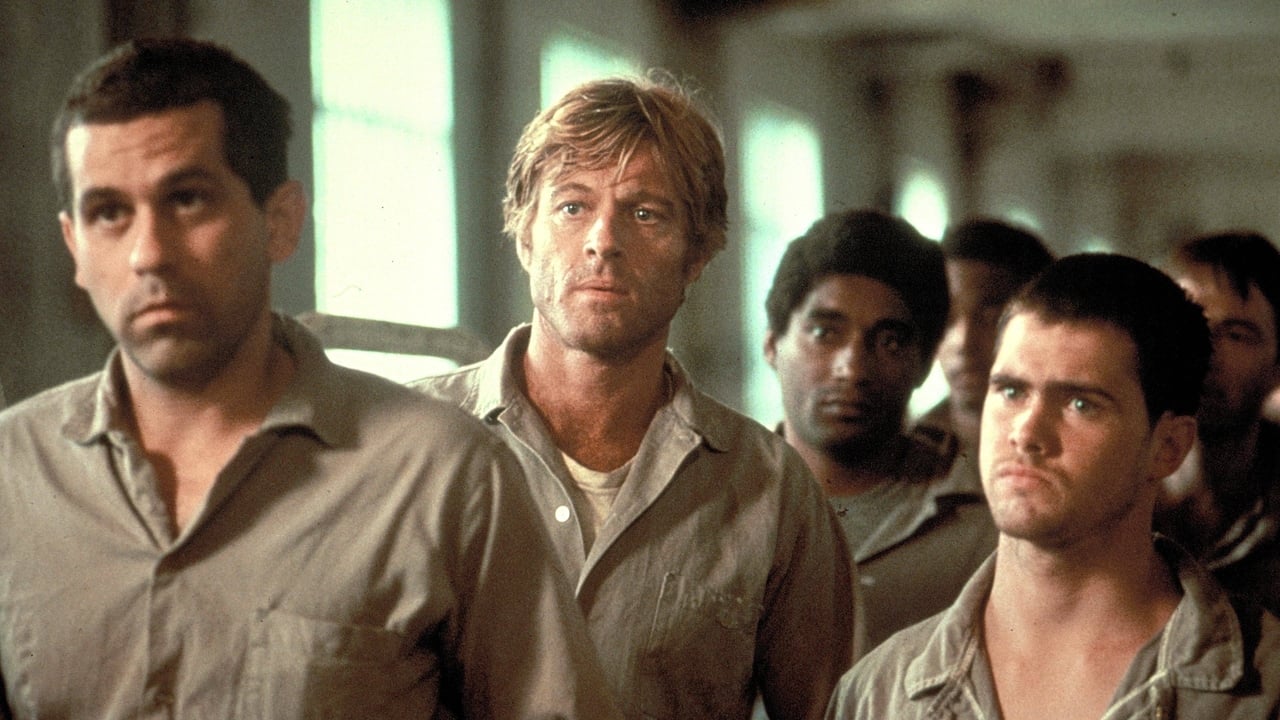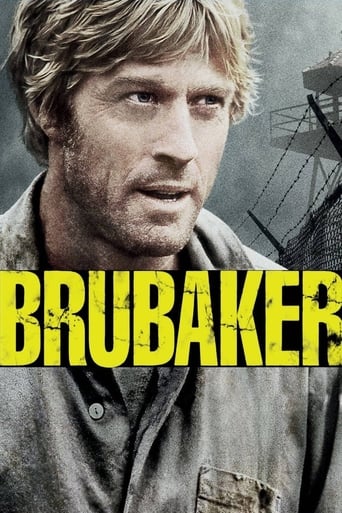



not horrible nor great
Just intense enough to provide a much-needed diversion, just lightweight enough to make you forget about it soon after it’s over. It’s not exactly “good,” per se, but it does what it sets out to do in terms of putting us on edge, which makes it … successful?
View MoreThe movie is made so realistic it has a lot of that WoW feeling at the right moments and never tooo over the top. the suspense is done so well and the emotion is felt. Very well put together with the music and all.
View MoreWorth seeing just to witness how winsome it is.
The film's based on an expose of actual occurrences at Arkansas' Cummins State Prison Farm, especially the secret convict burial ground found there.One thing for sure—this is not a date movie. Instead, it's a grim 2-hours redeemed by taking on a difficult topic, namely how some state prisons are run. Admittedly, the movie's lengthy, humorless, and undeviating in its narrative. But the 140-minutes is also richly detailed in its overall expose. Based on a true story, Redford plays a determined prison reformer who first impersonates an inmate in order to experience actual conditions at a prison farm. Then he assumes his official duties in casual dress, while continuing to mix with the convicts. Definitely, no romance here for movie star Redford.To say conditions at the penitentiary are corrupt understates them. The movie's quite good at showing how petty pay-offs decide who gets what among the inmates themselves, and then how the surrounding business community benefits from both inmate labor and the crops they produce. That's not to leave out state government and its slick go-betweens that tolerate the system since it does produce a profit.Determined to humanize brutal prison conditions, Redford takes a hands-on approach by daily eating and mingling with the convicts. Apparently, the higher-ups remain confident he'll be co-opted by the system at some point, just as previous reformers apparently were. However, they've underestimated his dedication, as even his politically liberal connection to the state governor, Lillian (Jane Alexander), finds out. Their low-key showdown is really the movie's most telling point. For it's the principled Redford's refusal to settle for a few changes that separates him from the more pragmatic Lillian. After all, only a few changes will leave the basically corrupt system in place. Redford understates his role in a generally emotionless way. And though he's in about every scene, he draws no attention to himself. Instead, as the pivotal convict Coombes, a commanding Yaphet Kotto gets the dramatic play. And in a touch of expert casting, the sly Murray Hamilton appears as a slippery politician who's used to smilingly fix things at the state level. The film's one false note occurs at the end,which is obviously staged. I can understand wanting to end on a hopeful note, but the uniform crowd response overdoes it. After all, wouldn't a few "realists" hang back in the interest of identifying with the new regime since that's where the future lies.Sad to say, I think the movie's also a reflection of too much of our current state of national affairs. On that national level, slick politicians maintain a system where the wealthy 1% rake off profits from a debt-ridden working class, kept in place by a growing government surveillance network. At the same time, our infrastructure crumbles like the prison roof in the movie. Of course, I'm not saying the country amounts to a prison, at least as long as the Constitution has some effect. But I am saying there are more parallels with Redford's movie than I'm comfortable with. Agree or not, the film is well worth pausing over.
View MoreRobert Redford stars in this film about a new prison warden attempting to weed out corruption in a decrepit prison farm. The twist early on is Brubaker's entry to the farm as a prisoner, so he can witness first-hand the situation he will be dealing with as warden. As a prisoner on the inside, he sees the brutal beatings of prisoners and witnesses their uncomfortable environment. One of the more interesting aspects of the plot is the use of prisoners as "overseers" of the other prisoners. Like the character of Dathan in Cecil B. DeMille's "The Ten Commandments", there are prisoners keeping other prisoners down, contributing to the penal deficiencies. These overseers take bribes, beat other prisoners and are generally malicious. This adds the twist to the plot - not only does Brubaker have to deal with the corrupt state officials running the prison system, he has to overcome the corrupt prisoners in charge of maintaining the farm. There is another complexity to this, because usually prisoner-on-prisoner brutality involves those on equal footing. Not here - the prisoners scramble for overseer appointments so they can dominate those they had just been with on equal ground. They learn their lessons well in the U.S. penal system. Almost every prison film features a scene or two dealing with "the hole," the solitary confinement cells. Brubaker is no different, although the two main scenes involving the isolation cells are pivotal. In the first, Brubaker is still posing as a prisoner, but he asserts his authority when an isolated prisoner (Morgan Freeman) loses his mind. The second scene takes place after Brubaker has taken over as warden, and he orders the solitarily-confined prisoners to be taken outside once a day and provided with sunglasses. The connection between these two scenes is very key in understanding Brubaker's motivations. He sees the effects of the penal system on Freeman's character, and when he takes over, Redford attempts to correct the ills of that particular penal problem. The symmetry was one of the better moments in the film, illustrating the process of improving the penal system. Redford's age is very apparent now, but in this 1980 film, he looks beleaguered. Is it the role, or the actor in the role? I enjoyed the stoic nature of his character, unwilling to bend or break when faced with the opposition presented by the corrupted state officials. The end of the film is sort of cheesy, with the inmates showing tribute to their fired warden as he rides out of sight. But overall, the film succeeds at showing two things - the mistreatment of prisoners (whether by fellow prisoners or "guards") and the corruption within the penal system. Redford shows a unique ability to respect many of his inmates, and this film is the only one focusing on the warden's perspective on prison. This different approach puts certain penal issues in a different light, although Redford's character still faces the same adversity as the inmates do--fighting a corrupt system attempting to keep them down. In one sense, Redford is an inmate, a "prisoner" of the penal system corruption, fighting for the rights of the prisoner. Last note - the movie is a little too long. That knocks it down a bit.
View MoreThis almost forgotten film should be analyzed today after its unexpected and unimagined possibility of an alternate reality that wasn't a complete fabrication. The story of a prison warden who wants to change everything that's wrong in the prison system of his state really happened. "Brubaker" focus on a challenge to a corrupt system that on the surface seems to be doing its service of punishing convicted criminals but also is a vile and dirty business whose purpose is to profit above all costs. The lead character, played by an unusual and remarkable Robert Redford, is introduced to us as a prisoner who barely speaks but observers everything concerning how inmates are treated by the guards, how the machine works behind bars and the constant brutality of the place. The plot twist to everyone is when he presents himself as the new warden and he sets up a whole reformation on the place, condemning what's wrong and doing what he believes it's right. There's plenty of benefits for the prisoners but the guards and the businessman who always gained advantages with the old administration aren't happy about this, and that misery and dissatisfaction goes back to the people who hired him, the governor and his staff who now pressure the man to go easy with his work. After all, they are losing a lot of money obtained with frauds and illegal schemes. One man alone means nothing so Brubaker is helped by some inmates and a local authority (Jane Alexander) who is close to the state governor, and will try to convince everyone that Brubaker's idealism if put to work can be profitable for everyone involved.Brubaker's idea isn't just to denounce the illegal affairs of the state and make budget cuts. He's more concerned with the way convicted felons are treated, want to stop their exploitation and make the place a safe environment instead of the critical animal factories that don't punish anyone but is only useful to transform them into bigger monsters whose only fate is either death, or commit more violent crimes or to return to the animal factory again. Sure, this idea is good and valuable but not practical. In the film's case, it fails because one can't change a system unless if one being part of it; Brubaker made the terrible mistake of not firing the whole officials team, and those guys still managed to cause harm and work their way behind his back; and the people with the money will always speak higher.Such idealism wouldn't work today, that's sure but it could worth a shot, specially in countries where the private initiative isn't the option (because politics are having their big time with a failing system that pays them well). Today's criminal minds are far more worse than the ones from the 1980's when this was made and they probably wouldn't leave a place where they could feel as if being on a hotel, practically with the cell keys on their hands, dictating orders like Pablo Escobar did in his "prison" time. But it can be made. And that final image of accomplish given here says everything even though things didn't turned the way it could. The film has a fine progression and it's greatly well acted by Alexander, Redford and heightened by convincing performances from trustworthy character actors Everett McGill, David Keith, Yaphet Kotto, Matt Clark, M. Emmet Walsh, Murray Hamilton and a young Morgan Freeman. "Brubaker" has that rare quality of being dreamy, that enlightening power some movies have in our reality and we want to believe of making a dream possible. To change the world. 8/10
View MoreThis movie tells the true story of a man called Henry Brubaker.This man arrives at a prison as an inmate and witnesses all the bad stuff that's going on there.Later he reveals he's the new warden of that prison and he's gonna make some changes.Brubaker from 1980 is directed by Stuart Rosenberg.Bob Rafelson started as the director before being replaced.Robert Redford does excellent job as Brubaker.Yaphet Kotto is superb as Richard "Dickie" Coombes.Jane Alexander is very good as Lillian Gray.Murray Hamilton is great as John Deach.Morgan Freeman is good as always as Walter.Matt Clark is terrific as Roy Purcell.M. Emmet Walsh does convincing job as C.P. Woodward.Albert Salmi is great as Rory Poke.Noble Willingham plays Dr. Fenster.Nicolas Cage makes his debut as an extra.The movie succeeds in showing the cruelty of the prison world.One can ask is this something they deserve.Once you commit a crime, you need to be punished.But how much punishment is too much?
View More